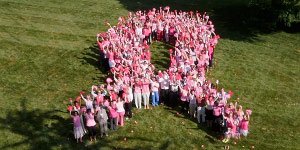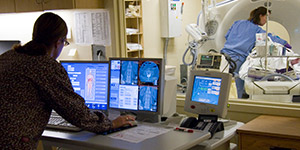Radiology at GBMC
Providing both outpatient and inpatient diagnostic imaging services for the greater Baltimore community
Our services include fluoroscopy, computerized tomography, ultrasound (general, vascular, echo), nuclear medicine, interventional radiology, and all general radiology procedures.
MRI and PET/CT services are provided on the GBMC campus by Advanced Radiology. To schedule an appointment for these procedures, you may contact them directly at 410-296-5610.
Outpatient radiology services are also provided in the Pavilion Imaging Center located between the Oasis Coffee Shop and Physician Pavilion West. Mammograms are specifically offered at the Pavilion Imaging Center. To schedule an appointment for these procedures, you may contact Advanced Radiology directly at 410-580-2330. You may also visit their website at www.advancedradiology.com.
Hours of Operation
The Department of Radiology supports the emergent hospital procedures 24 hours each day, and provides outpatient scheduled procedures as follows (Monday - Friday):
Diagnostic Radiology: 8:00am - 4:00pm
Computerized Tomography (CT): 7:30am - 4:30pm
Ultrasound (General, Vascular, Echo): 8:00am - 3:00pm
Nuclear Medicine: 8:00am - 3:00pm
Interventional Radiology: 8:00am - 3:00pm
Our Radiology Team
Our radiology team is comprised of radiologists, hospital administration, technologists and sonographers, radiology educators, and highly qualified support members. All of our radiologists are board certified. Our technologists are credentialed by the American Registry of Radiologic Technologists, and are licensed by the Maryland Board of Physicians. Our sonographers are certified by the American Registry of Diagnostic Medical Sonography. They are all experienced and caring professionals working together to help diagnose and treat our patients.
Schedule an Appointment with Radiology
Patient services assistants are available to schedule appointments from 8am -5pm Monday - Friday
- Please call 443.849.2343
- Select option 2 to schedule an appointment.
- Then, press option 1 to schedule a particular appointment type.
Please be prepared to provide:
- Patient name & date of birth
- Referring physician name
- Diagnosis/Reason for exam
- Exam type
- Insurance type
- Preferred date and time of exam
Our Services
The department of Radiology operates over 50 different imaging devices throughout the GBMC campus. We also offer approximately 500 different kinds of procedures, and perform over 142,000 procedures annually. In addition to cardiac CT scanning and virtual colonoscopy, our skilled staff performs many other diagnostic and therapeutic procedures that are tailored to meet the needs of the individual patient. Our services include:
- Diagnostic Radiology
- Interventional Radiology
- Computerized Tomography (CT)
- Ultrasound (General, Vascular, and Echocardiography)
- Nuclear Medicine
- Picture Archiving and Communication System (PACS)
- Magnetic Resonance Imaging (MRI)
- Positron Emission Tomography – Computed Tomography (PET/CT)
Diagnostic Radiology
The Diagnostic Radiology department performs a host of procedures in the x-ray department as well as by the bedside, in the operating room, and in the emergency room. This department performs well over 100 different kinds of procedures including routine chest x-rays and fluoroscopy procedures, complex vascular road mapping procedures in the operating room, and emergency room x-ray.
Interventional Radiology
Interventional Radiologists pioneered modern medicine with the invention of Angioplasty in 1964. Today an array of other diagnostic and therapeutic procedures are performed. They use x-rays, MRI and other imaging to advance a catheter in the body, usually in an artery, to treat at the source of the disease non-surgically. Some of the more recent advances in interventional radiology include:
- Nonsurgical ablation of tumors to kill cancer without harming the surrounding tissue
- Embolization therapy to stop hemorrhaging or to block the blood supply to a tumor
- Catheter-directed thrombolysis to clear blood clots, preventing disability from deep vein thrombosis and stroke
The Interventional Radiology Lab at GBMC offers over 170 procedures and performs 7,500 procedures annually. The lab is located on the 3rd floor of the main hospital.
Computerized Tomography (CT)
In the early 1970's the first CT exams were performed. CT uses a rotating unit and computers to create cross sectional images of the patient's anatomy. CT has made huge leaps in technology over the last decade. The new technology offers greater detail with less motion in a shorter period of time. This technology allows imaging of the heart non-invasively to evaluate disease, imaging of the colon thorough virtual colonoscopy, biopsies, and 3D rendering of images to aid in diagnosis and treatment. The CT department at GBMC has both 16 slice and 64 slice CT scanners. They offer over 60 types of procedures and perform 35,000 procedures annually. CT is located on the 3rd floor of the main hospital.
Ultrasound (General, Vascular, and Echocardiography)
Diagnostic sonography became available in the early 1970's and was quickly adapted by many specialties such as cardiology, vascular medicine, obstetrics and gynecology. It uses sound waves much like those used in Navy Sonar. No radiation is involved. High frequency sound waves are used to assess fetal development, internal organs, and circulation of blood vessels. The Ultrasound department at GBMC has 3 divisions, Diagnostic, Vascular, and Echo sonography. The Ultrasound department offers more than 80 types of procedures and performs 28,000 procedures annually. Ultrasound is located on the 1st and 3rd floor of the main hospital.
Nuclear Medicine
Whole-body scanning, in which the scanner uses an array of 10 scintillation detectors to scan the whole body, was introduced in 1953. The most common studies are myocardial perfusion, bone, lung, tumor, renal, hepabiliary and gastric. The Nuclear Medicine department at GBMC offers more than 50 types of procedures, and performs 8,500 procedures annually. The lab is located on the 1st floor of the main hospital.
PACS
In the mid 1990's Picture Archiving and Communications System (PACS) technology was born. In simple terms, PACs allows medical images to be stored and retrieved electronically, much like a digital camera. For more than 100 years, radiographic film has been the primary tool for capturing and interpreting disease processes. Over the past several decades, as new techniques and modalities have increasingly embraced digital imaging, including ultrasound, digital angiography, computed tomography, and magnetic resonance, a natural evolution to digital-based image management has become compelling. GBMC currently utilizes PACS technology to enhance the various services we offer.
MRI
In the 1980s Magnetic Resonance Imaging was adopted. This technology uses a gigantic magnet, can line up the protons -- or nuclei of hydrogen atoms -- in an object (or organism) to align with the north-south polarity of the magnet. A computer "reads" this to create an image in a process known as MRI, magnetic resonance imaging. MRI is excellent for observing soft tissues. GBMC and Medical Imaging of Baltimore have teamed together to provide MRI services. The MRI Center is located on the campus of GBMC.
PET/CT
PET (Positron Emission Tomography) machines, can reveal subtle metabolic processes such as tumor growth. In the year 2000, the U.S. Food and Drug Administration approved the marketing of a combination PET/CT machine, the first medical-imaging device that simultaneously and clearly reveals both anatomical details and metabolic processes within the body. PET also evaluates brain disease such as Parkinson's and Alzheimer's and early detection of stroke. GBMC and Medical Imaging of Baltimore have teamed together to provide PET/CT services located on the campus of GBMC.
Your First Appointment
When visiting the Department of Radiology, it is helpful to understand that we provide various services throughout the campus. Bear in mind that the main Department of Radiology (diagnostic radiology, CT, general ultrasound, interventional radiology) is on the third (main) floor of the hospital, just behind the The Corner Shop, in Zone B. If you are ever in doubt, use The Corner Shop as a landmark, and you will not have far to go from there!
Radiology services including vascular ultrasound, echocardiography and nuclear medicine are located on the first level of the hospital. The easiest access point for these services is to park in Bluebell Park and follow the signs from there.
What you need to bring for your scheduled or walk-in radiology examination:
- The prescription or physician's order for your examination
- Insurance card(s)
- Photo ID
- Any films from another facility, pertaining to the area to be examined (if applicable)
For All Scheduled Examinations:
- You will be asked to arrive 30 minutes prior to your appointment time to complete the registration process
- The duration of the examination differs based on the type of procedure that you will have. These details are relayed to the patient or the physician's office at the time of scheduling, as is the preparation for the exam, i.e. nothing to eat, no caffeine, etc.
For Scheduled Examinations on the 3rd - Main Level of the Hospital:
- Upon parking in Rose Park, enter the hospital and proceed to the Information Desk in the center of the Main Lobby to register for your radiology examination
- After you are registered, you will be taken either to the Radiology Reception Area, or to the Interventional Radiology Nursing Area (depending on your examination type)
- There you will await a technologist or nurse who will escort you to the area where your examination will be performed
- If you are having a CT scan of the abdomen and pelvis, it is possible to have a 90 minute wait prior to your exam to allow time to drink oral contrast
- If we are to draw your lab work prior to your CT scan, there is a one-hour wait for the results to become available after it is drawn, after which your CT scan will be performed
For Scheduled Examinations on the 1st level of the hospital:
- Upon parking in Bluebell Park enter the main door labeled as Zone C - Special Imaging, and proceed to the registration desk
- After being registered, the patient access personnel will contact the technologist or sonographer, who will come to the waiting area to escort you to your examination
Walk-In Examinations - Third Floor Only:
- All plain x-rays, i.e. chest, hand, foot, etc., are on a walk-in basis and, like all scheduled exams, depend on your insurance type
- Walk-in basis exams are available Monday - Friday 7:30am - 7:00pm
Some helpful tips:
- There is valet parking available at the main entrance in Zone B, as well as in the obstetrical entrance in Zone D
- If you are in need of a wheelchair they are readily available in the main lobby in Zone B, and at the entrance to Sherwood Surgical Center in Zone A
Related Services

Cancer Services at GBMC - Sandra and Malcolm Berman Cancer Institute
6715 N. Charles St Sandra R. Berman Pavilion - Towson, MD 21204

